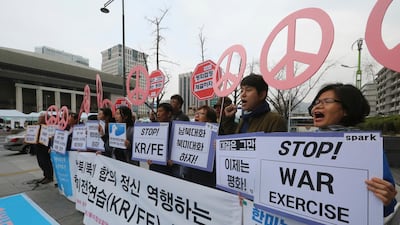The United States and South Korea started a low-key joint military drill on Sunday as a diplomatic thaw over North Korea gathered pace.
Tensions on the peninsula have showed increasing signs of easing in recent months after the isolated, nuclear-armed North proposed summits with the South and their "imperialist enemy" the US.
The annual Foal Eagle drill — a series of field training exercises involving about 11,500 American and 290,000 South Korean troops — began early on Sunday, Seoul's defence ministry spokesman said.
The manoeuvres — which were delayed to avoid clashing with February's Winter Olympics in the South - will be held for a month in April, about half the time they usually last.
This year's drills feature fewer strategic weapons such as a nuclear-powered aircraft carrier, the South's army said earlier. The deployment of such powerful weapons at past drills has frequently drawn an angry response from the North.
The two allies are also set to stage the annual Key Resolve drill — a tabletop exercise using mainly computer-based simulations — for the usual duration of two weeks beginning late this month.
Pyongyang, which habitually criticises the joint army drills between the South and the US as a rehearsal for invasion, has remained relatively quiet on the issue in recent weeks.
The Foal Eagle drill started the same day as a historic concert by South Korean pop stars in Pyongyang, which will be staged late on Sunday as a peace gesture ahead of this month's inter-Korea summit.
Eleven South Korean acts — including popular K-pop girlband Red Velvet — are set to perform in the North Korean capital, the first such concert there for more than a decade.
_______________
Read more:
Kim Jong-un open to discussing weapons programme: Chinese news agency
Korean unification has to be achieved, says South Korea official
_______________
The flurry of reconciliatory moves comes after the Pyeongchang Winter Games, which the North used to mount a charm offensive, sending athletes, cheerleaders and even leader Kim Jong Un's powerful sister as a delegate.
Mr Kim, who last week met with Chinese leader Xi Jinping in Beijing on his first overseas trip as leader, also met Olympics chief Thomas Bach in Pyongyang on Saturday, thanking him for helping to bring about a "dramatic thawing" of tensions on the peninsula.
Mr Kim is set to hold a summit with South Korean President Moon Jae-in on April 27 at the border truce village of Panmunjom — only the third time ever that leaders of the two countries have met.
Also on Sunday protesters gathered near the US embassy in Seoul to denounce the military manoeuvres, with signs reading "we oppose the annual joint military exercises".
Meanwhile on Saturday US Senator Elizabeth Warren said chaos in the Trump administration is harming its ability to formulate a coherent policy toward North Korea's nuclear programme and other important issues in Asia.
Vacancies in the foreign service are undermining Washington's ability to advance US interests, Ms Warren in Beijing.
US allies, while still supportive, are "searching for information" about US intentions in Asia, the Massachusetts Democrat said.
"This has been a chaotic foreign policy in the region, and that makes it hard to keep the allies that we need to accomplish our objectives closely stitched-in," she said.
The senator said President Donald Trump's agreement to meet with North Korean leader's was "rash", in the absence of Pyongyang's commitment to take "any steps at all to indicate that they were serious about denuclearisation".

